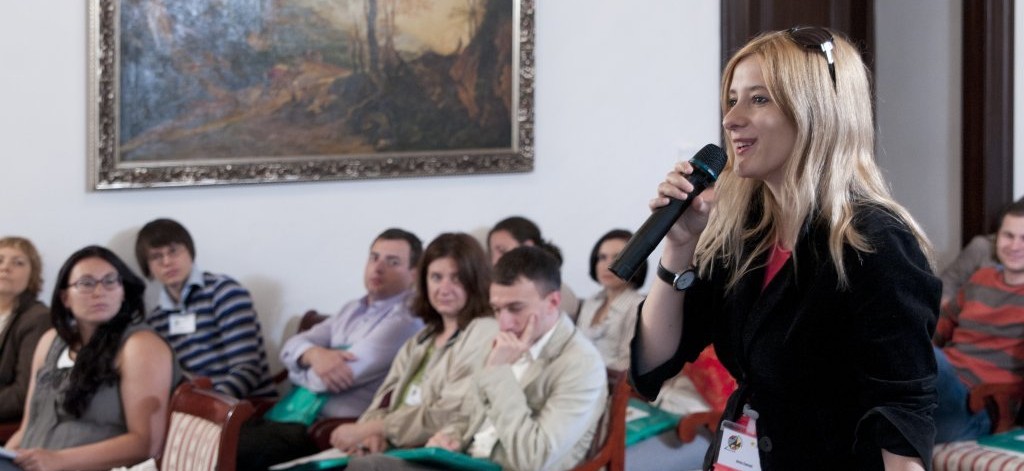
10th Visegrad Summer School starts, once again, in Villa Decius. The anniversary edition will be held under the honorary patronage of all the Ministers of Foreign Affairs of the Visegrad Group.
The programme consists of two parts: Alumni Congress, participants of which were selected from among more than 450 graduates of previous editions; and a series of lectures and workshops conducted by eminent European experts, which will be attended by 50 young people from Central and Eastern Europe. Additionally, there will be an outdoor concert, a unique event, which will introduce the inhabitants of Krakow and many tourists to exceptional artistic personalities of our countries. Among the performers you will find: the Hungarian band Fókatelep, VooVoo and Ukrainni and extremely popular in the Czech Republic and Hungary, the Slovak singer Szidi Tobias.
The Visegrad Summer School is an international interdisciplinary educational programme of the Villa Decius Association carried out for the 10th time in collaboration with the Foundation Cracovia Expres - Hungarian Centre in Krakow, the Association for International Affairs in Prague, Center for the Research of Ethnicity and Culture in Bratislava, and the Institute Euroregio Ukraine in Kiev, addressed to young people from the Czech Republic, Poland, Slovakia, Hungary and other countries of Central and Eastern Europe.
All editions of the Visegrad Summer School deal with the most topical issues for the functioning of the Visegrad Group and Europe, considered in the global context. School’s programme consists of lectures, debates, seminars, workshops, all conducted by an international team of experts from various fields of social, political and cultural life.
Previous editions were attended by nearly 450 people from the Visegrad Group, and from over 20 other, mainly Eastern and South-eastern European, countries. In connection with the jubilee character of this year's edition of the Visegrad Summer School, 40-person group of the, so called, “alumni” – selected among graduates of the previous editions – was invited to participate in the programme. They will take part in a week-long workshop (3 - 10 July), implemented in a proposed form, and focusing on issues previously identified by them as the most interesting in the context of the central idea of the Visegrad Summer School.
The programme of this part of the Visegrad Summer School will be opened with lecture of František Ružički – former Ambassador of Slovakia in Poland for many years associated with the Visegrad School – entitled “Creating European Foreign Policy – Issues and Challenges,” and the panel debate “Visegrad Branding Visibility,” including Eva Karádi, Wojciech Przybylski and Marek Sečkař.
In 8-10 July, the graduates will meet with 50 people chosen for this year's "regular" Visegrad Summer School in Villa Decius. Together, they will participate in an open two-day seminar, individually shaping the programme and the form of classes. The meeting will be followed by the Visegrad Sound Fusion concert (8, July at 6:30 p.m.), in which artists, who seek inspiration in multi-ethnic traditions of this part of Europe, will occur: Voo Voo and Ukrainni, Fókatelep and Szidi Tobias. The concert, taking place in Music Club Forty Kleparz, is also open to the public. Admission to the concert on the basis of free tickets available at Villa Decius and in City Information Point on ul. Św. Jana 2.
Among the major themes proposed to participants of the 10th Summer School will be the most current social, political and economic issues, among them: Polish presidency of the EU Council, taking into account previous Czech and Hungarian experience; the 20th anniversary of the Visegrad Group, a summary and assessment of its functioning, the prospects for the Visegrad cooperation and the long-term evaluation of social, political, economic and cultural transformations in the region, as well as individual countries; the Eastern Partnership, the region's energy security; demographic changes associated with the new migration phenomena; development of multicultural societies and new waves of extremism in the region; a new generation of socially engaged intelligentsia; as well as the issues of identity and cultural identity, role and place of media in the modern world, modern culture of Poland and neighboring countries.
The inauguration of the jubilee edition of the “regular” Visegrad Summer School (11, July, 10:30 a.m.), dedicated to the beginning of the Polish Presidency of the EU Council and the 20th anniversary of the Visegrad Group, will be an important highlight of the programme. Maciej Szpunar, Under-Secretary of State in the Ministry of Foreign Affairs, will give the opening lecture entitled “Challenge of Presidency.” Past experiences, priorities, conclusions and the specificity of the, so called, presidency from the Czech and Hungarian perspective, will also certainly be present during the traditional Ambassadors Debate, concentrating on the functioning of the Visegrad Group. Inauguration of the “regular” School will be yet another event open to the public.












